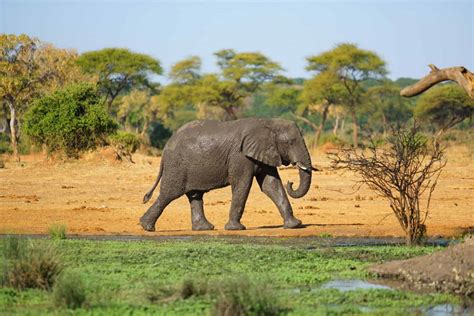Elephants have long fascinated humans with their majestic size, intelligent behavior, and complex social structures. However, one of the most intriguing aspects of these incredible creatures is their remarkable lifespan. Elephants are known to live well into their 60s and 70s in the wild, which is unusually long-lived compared to other terrestrial animals of similar size. In fact, elephants defy average lifespan expectations in several ways.

Elephants' extended lifespan is due in part to their slow rate of growth and development. Unlike many other animals, which mature quickly and reproduce at a young age, elephants take their time. They reach physical maturity around 10-15 years old, which allows them to invest more time and energy in developing strong social bonds, complex behaviors, and a robust immune system.
The Role of Social Structure in Elephant Longevity
Elephants' intricate social structures play a significant role in their remarkable lifespan. Living in close-knit family groups, led by matriarchal figures, provides elephants with a support system that fosters cooperation, mutual aid, and shared knowledge. This social safety net enables elephants to better cope with environmental stressors, such as droughts and predation, which can otherwise have a significant impact on their lifespan.

For example, older, experienced matriarchs often lead their family groups to the best feeding grounds and watering holes, reducing the energetic costs associated with foraging and increasing the group's overall access to resources. This shared knowledge and collective expertise help to ensure that all members of the group, regardless of age or physical condition, have a better chance of surviving and thriving.
Elephant's Adaptation to Environmental Stressors
Elephants have evolved various adaptations to cope with environmental stressors, which contribute to their remarkable lifespan. For instance, their large body size and specialized skin structure allow them to conserve water and energy, enabling them to survive in areas with limited resources. Additionally, their ability to migrate long distances in search of food, water, and suitable habitats helps to reduce their exposure to environmental stressors.

In addition, elephants have developed unique physiological adaptations, such as their ability to reduce their metabolic rate during times of food scarcity, which helps to conserve energy and extend their lifespan. These adaptations demonstrate the remarkable flexibility and resilience of elephants in the face of environmental challenges.
The Importance of Low Reproductive Rate in Elephant Longevity
Elephants' low reproductive rate also contributes to their remarkable lifespan. Unlike many other mammals, which reproduce rapidly and frequently, elephants have a relatively slow reproductive rate, typically giving birth to 2-4 calves in their lifetime. This reduced reproductive rate allows elephants to invest more energy in each calf, ensuring that they receive adequate care, nutrition, and socialization.

This strategy enables elephants to produce high-quality offspring, which are better equipped to survive and thrive in their environment. The low reproductive rate also allows elephants to maintain a stable population size, reducing the pressure on resources and minimizing the impact of environmental stressors.
Elephant's Brain Structure and Cognitive Abilities
Elephants' brain structure and cognitive abilities also play a significant role in their remarkable lifespan. Their large brain-to-body mass ratio and complex neural structures enable them to exhibit exceptional memory, learning, and problem-solving abilities. These cognitive abilities allow elephants to adapt to changing environments, learn from experience, and develop innovative solutions to challenges.

For example, elephants have been observed using tools to obtain food, solve problems, and even display empathy and self-awareness. These advanced cognitive abilities enable elephants to navigate complex social situations, make informed decisions, and respond to environmental challenges in a flexible and adaptive manner.
Gallery of Elephant Lifespan and Adaptations






FAQ Section
How long do elephants typically live in the wild?
+Elephants can live well into their 60s and 70s in the wild.
What is the main reason for elephants' remarkable lifespan?
+The main reason for elephants' remarkable lifespan is their slow rate of growth and development, which allows them to invest more time and energy in developing strong social bonds, complex behaviors, and a robust immune system.
How do elephants' social structures contribute to their longevity?
+Elephants' social structures provide a support system that fosters cooperation, mutual aid, and shared knowledge, enabling them to better cope with environmental stressors and increase their access to resources.
As we continue to learn more about these incredible creatures, it becomes clear that elephants defy average lifespan expectations in many ways. From their slow rate of growth and development to their complex social structures and cognitive abilities, elephants have evolved a range of adaptations that enable them to thrive in a wide range of environments. By studying these remarkable animals, we can gain a deeper appreciation for the intricate relationships between behavior, ecology, and longevity.
